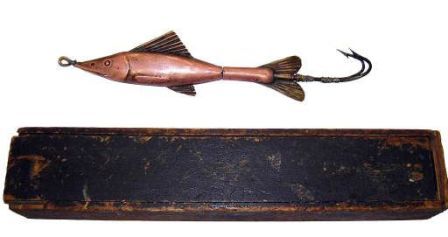|

|
Old Fishing Lures made by
Riley Haskell Continued
On Riley's
tombstone of which he shares with his father Foster, mother Polly, who face left
and brother George and himself on the north, it does state on the North side
under Riley "A member of Co. C. 88th Ohio Infantry". However doing research into
this I have found that Albert J Haskell, Riley's brother is listed in the 88th
Ohio Regiment but no mention of George or Riley. I will continue to research
this in the future, and hope someday to figure out that mystery. I have also
found reference to a civil war token that was produced by Riley and used as a
form of currency.
His
lure patent, #25,507 for the Haskell minnow was granted September 20th 1859, shaped like a fish or
minnow. Riley Haskell's minnow is very ornate for a trolling spoon, showing
eyes, fins, tail, and a very distinct scale pattern. His patent statement notes
he wanted to create a trolling lure resembling a fish, a portion of the lure
revolving on a shaft passing through the other portion. His lure was and has
been found in 4 sizes although only 3 of the sizes seem to have been produced in
quantity. 3 12", 4 1/2", and 6" were the standard sizes clearly stamped R.
Haskell Painesville. O. and Patent Date and on some only R. Haskell. The minnow
was said to have been constructed of copper, and brass. It would also be placed
in a silvering bath to give it an appealing appearance.
With
Riley's death in 1882, also seems to have been lost much of the history. In
closing of my section on Riley Haskell, I would like to share with fellow
antique lure collectors a glimpse into something which has been recovered.
Riley's last will and testament and its reading.
Will: Lake
County, Ohio Wills. Book D, p. 428. FHC #0974905. Document dated 15 Mar 1870.
Presented for probate 30 June 1882. Recorded 20 July 1882. Executor R. Murry
2nd. (or Munay). Witnesses J. T. Doolittle and L. C. Fenton. Testimony for
execution set for 6 July 1882 at 10 o'clock. L. C. Fenton could not remember
signing Riley Haskell's will as a witness. During the testimony it came out that
Riley Haskell "used to drink-but he was capable of doing business anytime." At
the time of Riley Haskell's probate the witness J. T. Doolittle was dead. His
brother, M. R. Doolittle, was called to testify to the authenticity of his
brother's signature.
Riley's
"next of kin" are mentioned in the document: William J. Haskell, brother,
residing in Concord; Albert J. Haskell, brother, Lydia C. Daniels, sister who
was bequeathed 1/3 of his property and possessions; Emily R. Haskell who was
bequeathed 1/3 of his property and possession. "Father and mother during their
natural lives 1/3 of his property and possessions. Upon decease of his parents,
the last 1/3 of his estate was to go to his sisters.
If Emily
dies without issue, any remaining part of the estate goes to Lydia C. Daniels
and her heirs forever."
|